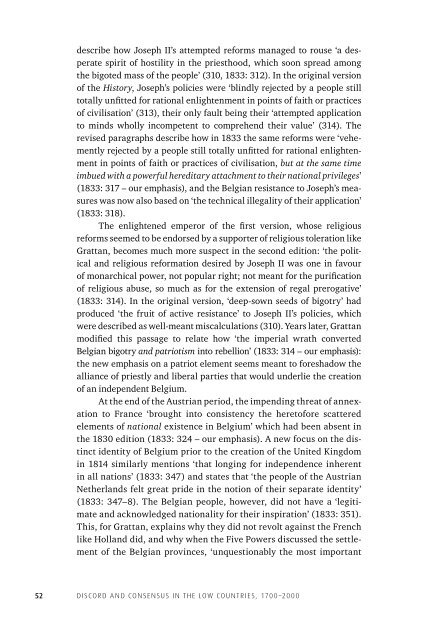Discord Consensus
7aze300jFJo
7aze300jFJo
Create successful ePaper yourself
Turn your PDF publications into a flip-book with our unique Google optimized e-Paper software.
describe how Joseph II’s attempted reforms managed to rouse ‘a desperate<br />
spirit of hostility in the priesthood, which soon spread among<br />
the bigoted mass of the people’ (310, 1833: 312). In the original version<br />
of the History, Joseph’s policies were ‘blindly rejected by a people still<br />
totally unfitted for rational enlightenment in points of faith or practices<br />
of civilisation’ (313), their only fault being their ‘attempted application<br />
to minds wholly incompetent to comprehend their value’ (314). The<br />
revised paragraphs describe how in 1833 the same reforms were ‘vehemently<br />
rejected by a people still totally unfitted for rational enlightenment<br />
in points of faith or practices of civilisation, but at the same time<br />
imbued with a powerful hereditary attachment to their national privileges’<br />
(1833: 317 –our emphasis), and the Belgian resistance to Joseph’s measures<br />
was now also based on ‘the technical illegality of their application’<br />
(1833: 318).<br />
The enlightened emperor of the first version, whose religious<br />
reforms seemed to be endorsed by a supporter of religious toleration like<br />
Grattan, becomes much more suspect in the second edition: ‘the political<br />
and religious reformation desired by Joseph II was one in favour<br />
of monarchical power, not popular right; not meant for the purification<br />
of religious abuse, so much as for the extension of regal prerogative’<br />
(1833: 314). In the original version, ‘deep-sown seeds of bigotry’ had<br />
produced ‘the fruit of active resistance’ to Joseph II’s policies, which<br />
were described as well-meant miscalculations (310). Years later, Grattan<br />
modified this passage to relate how ‘the imperial wrath converted<br />
Belgian bigotry and patriotism into rebellion’ (1833: 314 –our emphasis):<br />
the new emphasis on a patriot element seems meant to foreshadow the<br />
alliance of priestly and liberal parties that would underlie the creation<br />
of an independent Belgium.<br />
At the end of the Austrian period, the impending threat of annexation<br />
to France ‘brought into consistency the heretofore scattered<br />
elements of national existence in Belgium’ which had been absent in<br />
the 1830 edition (1833: 324 –our emphasis). A new focus on the distinct<br />
identity of Belgium prior to the creation of the United Kingdom<br />
in 1814 similarly mentions ‘that longing for independence inherent<br />
in all nations’ (1833: 347) and states that ‘the people of the Austrian<br />
Netherlands felt great pride in the notion of their separate identity’<br />
(1833: 347–8). The Belgian people, however, did not have a ‘legitimate<br />
and acknowledged nationality for their inspiration’ (1833: 351).<br />
This, for Grattan, explains why they did not revolt against the French<br />
like Holland did, and why when the Five Powers discussed the settlement<br />
of the Belgian provinces, ‘unquestionably the most important<br />
52<br />
DISCORD AND CONSENSUS IN THE LOW COUNTRIES, 1700–2000


